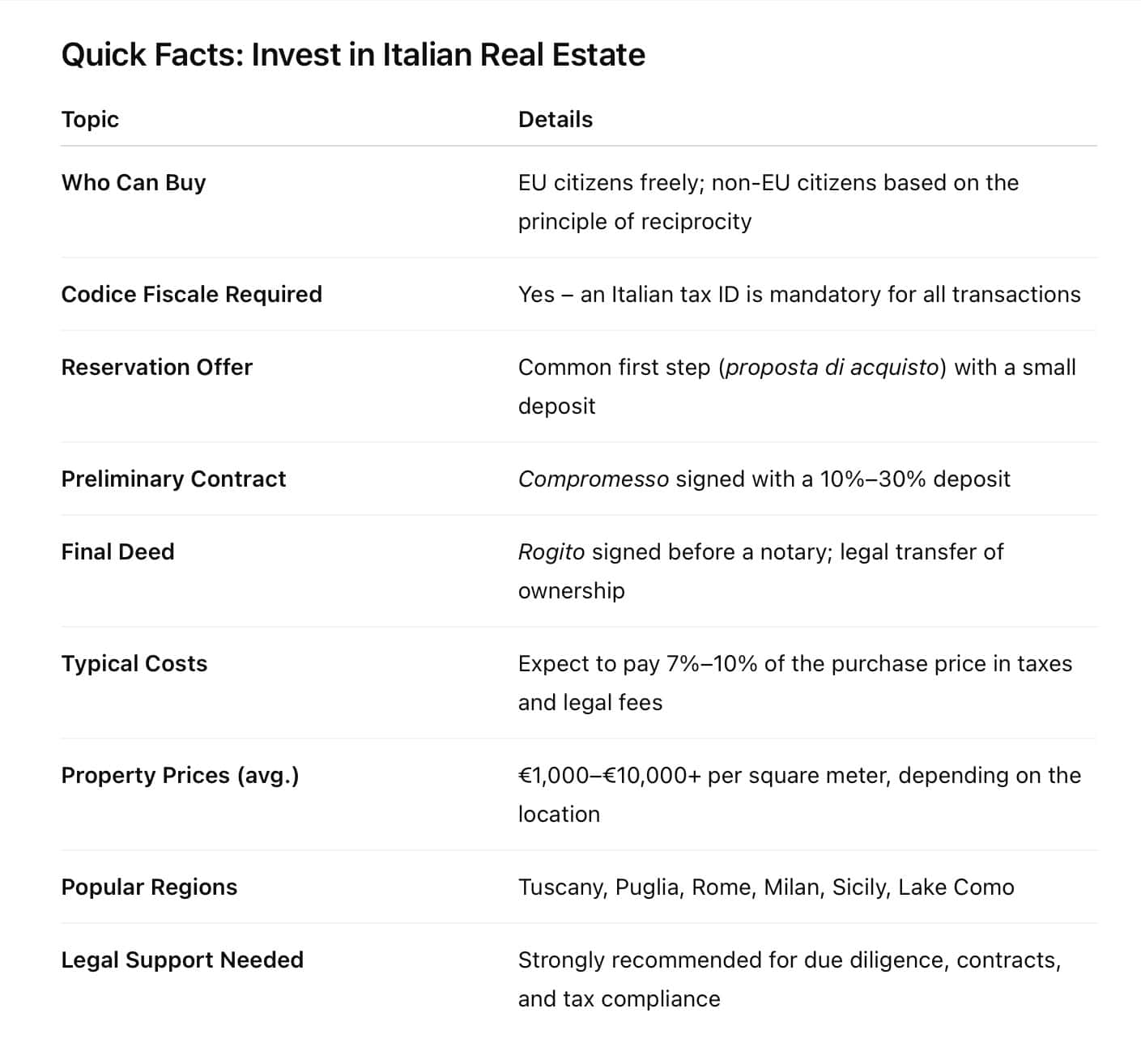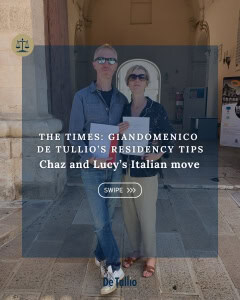Italy’s fiscal landscape recently underwent significant change with the enactment of Article 1 of Legislative Decree No. 209 on December 27, 2023, titled “Implementation of the tax reform on international taxation.” This pivotal decree ushered in Italian tax residency changes, particularly impacting existing favourable tax regimes. In this guide, we explore these changes.
Italian Tax Residency Changes Revise Residency Criteria
Effective January 1, 2024, the amended Article 2, paragraph 2, of Presidential Decree No. 917 of December 22, 1986, introduces new criteria for determining fiscal residency in Italy. Individuals are now considered fiscally resident if, for the majority of the tax period (over 183 days, fractional days included), they domicile in Italy, hold residency in Italy as per Article 43 of the Civil Code, or are physically present in Italy. This marks a significant departure from the previous criteria.
Furthermore, if individuals register at a local municipality for the majority of the tax period, authorities presume residency unless proven otherwise. It’s crucial to note that this registration is a relative legal presumption, providing an opportunity for “presumed” residents to present contrary evidence demonstrating their actual residence abroad or non-fiscal residency in Italy.
Italian Tax Residency Changes Impact Domicile Interpretation
Notably, the interpretation of domicile has undergone a paradigm shift. The exclusion of the civil code in interpreting domicile now places exclusive importance on the “place where personal and family relations primarily develop.” This legislative change establishes a clear hierarchy among the linking criteria, emphasising personal and family relationships over economic and work-related interests.
However, the reference to the civil law definition of residency under Article 43 of the Civil Code remains unchanged, creating an interesting interplay between the two criteria.
Italian Tax Residency Changes Link Criteria to Physical Presence
Starting January 1, 2024, authorities have introduced a new criterion linking physical presence within national borders for the majority of the tax period. This criterion, however, does not align with the expectations set by the Delegated Law for the tax system reform (Law No. 111 of August 9, 2023), as it does not introduce the provision for tax year fractionation, commonly known as the “split year.”
Impact on Tax Regimes
The practical implications of these legislative changes on tax regimes are paramount. Let’s delve into two significant regimes affected by these changes: the new-resident regime under Article 24-bis of Presidential Decree No. 917 of December 22, 1986, and the expatriate worker regime regulated by Legislative Decree No. 147 of September 14, 2015, modified by Article 5 of Legislative Decree No. 209 of December 27, 2023.
New-Resident Regime Changes
Article 5 of Legislative Decree No. 209 of December 27, 2023, introduces sweeping modifications to the “new-resident regime.” This regime, in its current formulation, extends tax benefits to income from dependent work, similar income, and income from self-employment produced in Italy by workers transferring their fiscal residency.
Notably, these incomes, up to a limit of six hundred thousand euros per year, now contribute 50% tax. This represents a notable reduction from the previous regime. The new-resident regime is applicable from the tax year of acquiring fiscal residency and for the four subsequent tax periods.
The New-Resident Regime is Contingent on Conditions
Workers must commit to fiscally residing in Italy for at least four tax periods.
Workers cannot have been fiscally resident in Italy in the three tax periods prior to their transfer.
If a worker conducts work in Italy for the same employer they worked for abroad before the transfer or for an employer within the same corporate group, they must meet the minimum foreign residency requirement:
- Six tax periods if the worker was not previously employed in Italy by the same employer or a subject belonging to the same group.
- If the worker was employed in Italy for the same employer or a group-affiliated employer before transferring abroad, the minimum foreign residency requirement is seven tax periods. Additionally, the worker must carry out work activities in the Italian territory for the majority of the tax period.
- Workers must possess qualifications or specialisation as defined by Legislative Decree No. 108 of June 28, 2012, and Legislative Decree No. 206 of November 9, 2007.
Additionally, the contribution on overall income is now reduced to 40% if the worker relocates to Italy with a minor. If a child is born during the regime period, application of this benefit starts from the ongoing tax year at the time of the child’s birth. To qualify, during the regime period, the minor child must remain resident in Italy.
These new provisions will apply to individuals transferring fiscal residency to Italy starting from the 2024 tax year
Individuals who transferred their registry residence by December 31, 2023, will continue to apply the previous provisions regarding the application of the new-resident regime.
For individuals transferring registry residence to Italy in 2024, the application of the regime can extend to an additional three years if they became residential property owners, by December 31, 2023, or within twelve months prior to transferring to Italy.
The property must however be the main residence in Italy. The percentage of non-contribution income, for the additional three years, is 50%.
Increase in IVIE Tax Rate
Law No. 213 of December 29, 2023 (Budget Law 2024) introduces an increase in tax rate due on real estate held abroad (IVIE). The rate rises from the current 0.76% to 1.06%. The determination of the taxable base remains unchanged from current legislative provisions. The determination relies on whether the property is in an EU/EEA member state or an extra EU/EEA state. The revenue agency calculates the taxable base on the cadastral value, acquisition cost, or market value.
Increase in IVAFE Rate for Financial Assets Held in Privileged Tax Jurisdictions
Law No. 213 of December 29, 2023 (Budget Law 2024) also raises the rate of the tax due on financial assets (IVAFE) held in states or territories with privileged tax regimes identified by the Ministry of Economy and Finance Decree of May 4, 1999, and subsequent amendments. The rate increases from the current 0.2% to 0.4%.
IVAFE continues to apply to the value of financial products, current accounts, and savings accounts held abroad. The calculation considers the percentage of ownership in the case of joint ownership and the number of days of possession.The value of the financial asset as of December 31 of the tax year or the market value recorded at the end of the holding period in the case of intra-annual transfers represents the taxable base. In the case of current accounts, tax is payable at a fixed rate of 34.20 Euros, indexed based on the number of days of possession.
Note that Switzerland does not fall within the scope of the provision concerning the increase in the IVAFE rate. Starting from the 2024 tax year, Switzerland is no longer listed among the countries and territories in the May 4, 1999 decree. Therefore, financial assets held in Switzerland will remain subject to the 0.2% IVAFE rate.
Changes in Italian Tax Residency apply to the 2024 tax year
The changes in Italian tax residency criteria bring forth a dynamic landscape with profound implications for individuals and their tax obligations. The revised criteria not only redefine the notion of fiscal residency but also reshape the benefits and conditions associated with specific tax regimes. Navigating this new terrain requires a nuanced understanding of the amended regulations and their far-reaching consequences. As individuals and tax professionals adapt to these changes, staying informed and proactive becomes imperative in ensuring compliance and optimising financial outcomes in the evolving Italian tax framework.
Finally …
Understanding and adapting to the changes in Italian tax residency in 2024 may necessitate professional assistance. For those seeking support, the De Tullio Law Firm team, specialists in Italian and cross-border property, inheritance, and tax matters, is “right beside you”. For a free consultation on new regulations or compliance with Italian tax matters, contact us.








 With the aforementioned exemption under the FPPRA, Canadian investors exploring Italian real estate can now seize promising prospects.
With the aforementioned exemption under the FPPRA, Canadian investors exploring Italian real estate can now seize promising prospects.